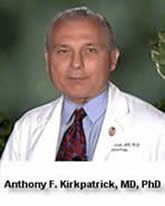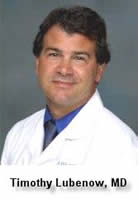Anthony F. Kirkpatrick, M.D., Ph.D., Chairman
Charles Berde, M.D., PhD. • Timothy Lubenow, M.D. • Wen-hsien Wu, M.D., M.S.
Robert Jay Schwartzman, M.D. • Srinivasa Raja, M.D. • Gustavo C. Roman, M.D.
Sabine Kost-Byerly, M.D. • Adam L. Seidner, M.D., M.P.H • Peter Wilson, M.D.
Ralph-Thomas Kiefer, M.D. • Peter Rohr, M.D. • Stephen M. Butler, M.D.
Takashi Mashimo, M.D., D.M.Sc. • Edward Covington, M.D.
The affiliations of committee members are listed at:
http://www.rsdfoundation.org/en/en_sac.html
On May 14, 2003, Dr. Anthony Kirkpatrick, a member of the AMA and Chairman of the Scientific Advisory Committee of the International  Research Foundation for RSD/CRPS, filed a complaint with the AMA putting the AMA on notice that it was causing ongoing injury to patients by disseminating false and misleading information about the diagnosis of reflex sympathetic dystrophy (RSD) also referred to as complex regional pain syndrome (CRPS Type I).
Research Foundation for RSD/CRPS, filed a complaint with the AMA putting the AMA on notice that it was causing ongoing injury to patients by disseminating false and misleading information about the diagnosis of reflex sympathetic dystrophy (RSD) also referred to as complex regional pain syndrome (CRPS Type I).
The original complaint was sent to Barry Bowlus, AMA's Senior Acquisitions Editor and then to the highest levels within the AMA, including the President. 1 Kirkpatrick wrote: "The false assertions by the AMA are particularly egregious because RSD/CRPS is a syndrome that must be treated in a timely manner in order to avert exacerbation of symptoms leading to irreversible impairment and suffering. I have personally witnessed patients with RSD/CRPS lose hope and commit suicide following denial of authorization for care by insurance carriers."
There are an estimated 1.5 million Americans who have been affected by this chronic, neurological syndrome. The syndrome can start after minor trauma, such as one caused by a sprained finger, or by a gunshot wound. But it can also be triggered by a heart attack, a stroke, surgery or repetitive vibration motion — such as the kind that comes from a jackhammer or weed-cutting tool. While the cause of the disorder remains unknown, experts believe it is the result of a malfunction or misfiring in the body's sympathetic nervous system, the part of the nervous system that regulates involuntary reactions to stress. The injury heals but the pain continues.
As RSD progresses over time, especially without treatment, the syndrome tends to become more unresponsive to treatment. Hence, early diagnosis and treatment are imperative. RSD can remain localized to one region of the body indefinitely. In other cases, it spreads to large segments of the body spontaneously or by trauma leading to permanent deformities and widespread immobility of limbs. At an advanced stage of the illness, all patients develop significant psychiatric problems and narcotic dependency, and are left completely incapacitated. Some commit suicide.
The critical issue raised by Kirkpatrick is contained in the AMA GUIDES TO THE EVALUATION OF PERMANENT IMPAIRMENT, 5th Edition. On page 496, the clinical guidelines state that there "must" be at least eight (8) concurrent, objective signs for RSD in order to make the diagnosis.2 The AMA clinical guidelines refer to objective diagnostic criteria such as changes in skin temperature, color, sweating, swelling, etc. Kirkpatrick informed the AMA, "...nowhere in the scientific literature will you find such stringent criteria for the diagnosis of RSD/CRPS."
Dr. Timothy Lubenow, Professor of Anesthesiology and Director of the Pain Center at Rush University Medical Center, Chicago emphasizes, "I have diagnosed and treated hundreds of patients with RSD and can not recall a single case where a patient had eight concurrent objective findings for RSD."
Despite numerous attempts by Kirkpatrick to obtain a response to his complaint, none was forthcoming from the AMA until he wrote to Dr. Michael Maves, Executive VP and CEO of the AMA.  In his letter of June 25, 2004, Kirkpatrick requested that Maves publish a prompt retraction of the clinical guidelines. 1. Rather than publish a retraction, Maves instead directed Kirkpatrick to a neurology chapter in the same volume, where he claimed different, less stringent diagnostic criteria for RSD could be found . 3, 4 He suggested the neurology approach allows for "greater flexibility to the diagnostic criteria..." for RSD.
In his letter of June 25, 2004, Kirkpatrick requested that Maves publish a prompt retraction of the clinical guidelines. 1. Rather than publish a retraction, Maves instead directed Kirkpatrick to a neurology chapter in the same volume, where he claimed different, less stringent diagnostic criteria for RSD could be found . 3, 4 He suggested the neurology approach allows for "greater flexibility to the diagnostic criteria..." for RSD.
Thus, according to Maves, the AMA believes that it is acceptable to publish stringent diagnostic criteria for RSD in one chapter and contradict those stringent criteria in another chapter within the same text. Furthermore, contrary to what he stated, the neurology chapter does not contain any criteria to make the diagnosis of RSD. The chapter focuses instead on case reports intended to assist the physician in determining physical impairments in patients that have been diagnosed with RSD.
Diagnostic information published by the AMA must be unbiased, scientific, evidence-based, and peer-reviewed. Yet, when confronted with its error, the AMA refuses to set the record straight and stand accountable before the public.
The harm caused by the AMA's error has been devastating to patients with RSD. Raymond Hale, a school teacher, was denied insurance authorization for treatment of RSD of his lower extremity. The specific basis for the treatment denial was not disclosed to the patient by the insurance carrier. However, through his own painstaking investigation, he found a document showing that a physician employed by his insurance company used the AMA's stringent, but incorrect, diagnostic criteria for RSD to deny authorization for treatment and he was accused of "faking" his injuries. Hale watched his symptoms worsen as he appealed the decision.
Kirkpatrick states, "Many of my RSD patients are not told by their insurance company that the AMA guidelines are being used to deny their authorization for treatment and, therefore, they have no way to defend themselves against an attack on their health by the AMA."
Seventeen-year-old Sarah Young's battle with RSD began when she was hit with a softball. She says, "I went to therapy and it kind of made me feel like I was kinda crazy but, I knew I wasn't, but I was like
She says, "I went to therapy and it kind of made me feel like I was kinda crazy but, I knew I wasn't, but I was like  really suicidal." Sarah's mother is livid about the AMA's conduct. "Sarah had only two objective findings to support the diagnosis of RSD. If we would have waited until all eight objective findings were found before reaching a diagnosis of RSD, as published by the AMA, we would have lost a very special young lady and that to me is unthinkable. The fact that these people with the AMA are willing to prolong pain and suffering for these children and parents is deplorable. If a parent was to withhold medical care from their child then they would be charged with a crime; where is the difference?"
really suicidal." Sarah's mother is livid about the AMA's conduct. "Sarah had only two objective findings to support the diagnosis of RSD. If we would have waited until all eight objective findings were found before reaching a diagnosis of RSD, as published by the AMA, we would have lost a very special young lady and that to me is unthinkable. The fact that these people with the AMA are willing to prolong pain and suffering for these children and parents is deplorable. If a parent was to withhold medical care from their child then they would be charged with a crime; where is the difference?"
Americans from all walks of life fall victim to this health care nightmare created by the AMA, including physicians. Lori Eley, R.N., recently wrote: "... my husband, Dr. John Eley, was a prominent Board Certified Family Medicine Physician who was injured and is now suffering this horrible disease RSD/CRPS, which, for the past 5 years, has left him unable to practice medicine. As a physician, he is appalled by the AMA..., knowing full well what he experiences from minute to minute, day by day, are not 8 specific symptoms occurring all at one time."
Recent decisions by the US Supreme Court, which have the effect of restricting lawsuits against HMOs for acts of negligence, are making things a lot tougher for patients who have to deal with third party payers. "The last thing patients need now is incorrect and seemingly bogus clinical guidelines published by the AMA that are so restrictive that they prevent the diagnosis and treatment of a potentially catastrophic and lethal illness," Lubenow said.
The written complaint was delivered to the AMA on May 14, 2003, and again more recently was furnished to the President of the AMA as well as to the Editor-in-Chief of the Journal of the American Medical Association. Despite the fact that these top officials are on notice that the AMA's error is causing ongoing injury to patients, they are not willing to make the commitment to publicly and quickly set the record straight.
Deborah M. Shanley
Executive Director
International Research Foundation for RSD/CRPS
On October 28, 2004, I received a second letter from Dr. Michael Maves. 5 Rather than offering to publish a retraction of the erroneous AMA clinical Guides for RSD in one of AMA's numerous publications, he states, "The AMA rejects your assertion that the Guides contain false or misleading information about the diagnosis of.. (RSD)..." He invited me, however, to provide input into a future committee at some unspecified time to write the 6th edition of the Guides. I am not one to be pacified by such an offer in exchange for keeping a lid on the injuries to patients being caused by the AMA.
This organization once represented more than two-thirds of American doctors but soon will represent less than one-third. Despite the AMA's involvement in the Sunbeam scandal (an uncritical proposed endorsement of medical products under the leadership of Dr. John Seward) and the real estate scandal (under the leadership of Dr. James Sammons), I continued my membership in the AMA. However, the AMA's recent attack on the health of patients with RSD is the last straw. I have resigned my membership from the organization. I would urge all physicians who still cling to their AMA membership to do the same.
Anthony F. Kirkpatrick, M.D., Ph.D.
- June 25, 2004: Dr. Kirkpatrick filed complaint with AMA (click for reference)
- AMA GUIDES TO THE EVALUATION OF PERMANENT IMPAIRMENT, 5th Edition, pp 495-97 (click for reference)
- July 9, 2004: Letter from Dr. Maves to Dr. Kirkpatrick (click for reference)
- Neurology Chapter, AMA GUIDES TO THE EVALUATION OF PERMANENT IMPAIRMENT, 5th Edition, pp 343-44 (click for reference)
- October 28 , 2004: Letter from Dr. Maves to Dr. Kirkpatrick (click for reference)

